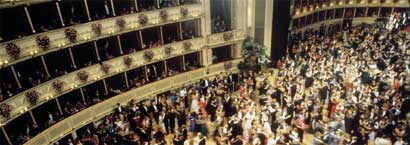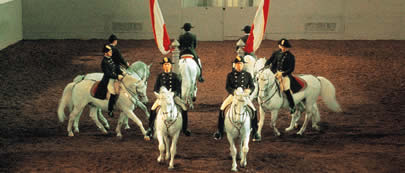|
|
| |
AUSTRIA
VIENNA
As the capital of the Austro-Hungarian Empire, over a period of several centuries, Vienna was able to harness the creative and intellectual resources of all of central Europe, setting into motion a powerful, long-standing tradition of cultural and artistic achievement and intellectual innovation that shows no signs of letting up. Vienna was - and remains one of the undisputed capitals of art, music, architecture, fashion, theater, literature, intellectual pursuits, as well as a site of political and social significance in the international arena.
 Copyright © Austrian National Tourist OfficeMuch of Vienna's cultural history is reflected in magnificent buildings and some of the glorious music created here. The Viennese are justifiably proud of their heritage - but much as they cherish the past, they don't live in it any more. What makes Vienna so particularly beautiful and interesting is the way the old and the new live together harmoniously. It is no coincidence that some of the resplendent buildings of the old days have taken up a new role in shaping the future and history of Austria and, ultimately, Europe - it was at Baroque Belvedere Palace where Austria's State Treaty was signed; Schonbrunn Palace, the summer residence of the Habsburgs, has sometimes served as background for international state receptions, such as the historic meeting between Kennedy and Khrushchev; some of the most venerable palaces and mansions now house government offices; and recently, the Imperial Palace hosted a grand summit meeting of all members of the European Union where decisive steps for Europe's future were taken.
Imperial Vienna
No other city in the world merits the term "imperial" as much as Vienna. For 640 years, the Habsburgs ruled a huge empire from Vienna, the capital city of a monarchy made up of many different nationalities - it was so vast that it was said at one point that the sun never sets on the Austrian empire.î The city is still dominated by the palaces, squares and many other vestiges of the imperial capital.
 Copyright © Austrian National Tourist OfficeThe Habsburgs preferred to expand their territories through marriage rather than war, and hence Maximilian's famous maxim: "Let others wage war, you, happy Austria, marry !" ("Bella gerant alii, tu felix Austria nube") became the catchword for an entire dynasty. Instead, the Habsburgs devoted their time to building magnificent palaces, grand boulevards for their processions and to raising the cultural and intellectual life in the empire's capital. After all, it was the Viennese court that was responsible for the atmosphere in which some of the world's greatest musicians flourished and were able to write some of the world's greatest music. At the same time, the Habsburgs left behind a magnificent art collection. The Habsburg empire is now part of history, but its magic lives on in Vienna. When the heavens smile on the city, the term the Viennese use to this day is Kaiserwetter - weather fit for an emperor.
 Copyright © Austrian National Tourist Office
Many stores still take pride in having been purveyors to the "k.u.k." (imperial-royal) court; at some former imperial court bakeries and numerous coffeehouses, one may sip a Kaisermelange (imperial coffee). Anybody with enough money and a taste for luxury naturally stays at the Hotel Imperial. One of the hottest tourist attractions remains a performance of the Lipizzans, those famous White Stallions, at the (originally imperial) Spanish Riding School. On Sundays and Holidays, the- formerly imperial - Vienna Boys' Choir performs at the Chapel of the Imperial Palace. Vienna also sports an old-fashioned leisurely mode of transportation worthy of an emperor: a ride in a horse-drawn carriage, a Fiaker, is a special treat for Viennese and tourists alike; and one of Vienna's most festive balls is the Imperial Ball (Kaiserball) at the Imperial Palace.
 Copyright © Austrian National Tourist Office
* Information is courtesy of the Austrian National Tourist Office
| |
|
Festivals & Events
Spanish Riding School
The Spanish Riding School in Vienna is one of Austria's most known attractions. Please note that seating as well as standing room at the Imperial Palace Home of the Spanish Riding School is limited.
Info-Hotline:
Tel: (+431) 533 90 31
Fax: (+431) 533 90 32 40
Vienna Boys' Choir
(Wiener Sängerknaben)
An Austrian cultural institution, the Vienna Boys Choir can usually be heard Sunday mornings at the Imperial Palace Chapel and various concert performances.
Bruckner Festival Linz
September 15 - October 6
Numerous classical concerts with world renown orchestras and soloists in Anton Bruckners hometown. The Festival is ushered in each year by the Linz Cloud of Sounds.
Tel: ++43-732-77 52 30
kassa@liva.at
Vienna Music Film Festival
Annually in July and August
Famous opera performances on screen, masterful concert interpretations every evening under the stars with the splendid backdrop of Vienna's City Hall
Free admission nightly during the summer months.
Vienna City Hall Park
Music Festival
(as part of the Vienna Festival)
May 1 to June 16
The Vienna Festival concerts are the highlights of Vienna's concert season. The world's most renowned orchestras, conductors and soloists will be performing, among them in 2002: the Berlin Philharmonic Orchestra directed by Claudio Abbado and the Wiener Philharmoniker (Vienna Philharmonic Orchestra) directed by Sir Simon Rattle.
Osterklang Wien
Annually around Easter time
The music festival is opened by Bach's "Passion of St. Mathews" performed by the Wiener Philharmoniker under Nikolaus Harnoncourt at the Musikverein. Concerts at the Musikverein, the Konzerthaus and the Hofburgkapelle, a scenic oratorio performed at Odeon and an Easter Night concert at St. Stephen's cathedral round off the program.
tickets@osterklang.at
Vienna State Opera
One of the most famous opera houses in the world, program runs from September through June each year.
Tel: ++43-1-513 1 513 (ticket sales one month prior to desired performance)
Melk Abbey
Lower Austria
Mid April to Mid November
This Benedictine Abbey was founded in 1089 and is a major representation of Austrian Baroque architecture. Melk Abbey is overlooking the Danube River and can easily be visited during any Wachau Valley excursions.
|
|
|